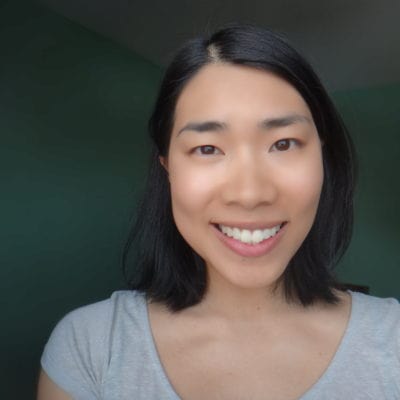Interview with Dietitian Selene Yan – Perspective On Eating Disorders
by Gurveen Jaggi

Selene Yan is a Registered Dietitian and Certified Intuitive Eating Counsellor with over ten years of experience.
Her goal is to help individuals of all sizes cultivate trust in their bodies and achieve peace with food.
In this interview, she shares her perspective about weight stigma, body image, and the value of rapport building with clients.

Describe what you do for work.
I work as a dietitian specializing in eating disorders and disordered eating.
I have a special interest in working with individuals to improve body image.
As a result, I spend most of my time providing individual nutrition counselling. I also facilitate support groups with EDSNA (Eating Disorder Support Network of Alberta)
What type of clients do you work with?
I work with adults and young adults who struggle in their relationship with food and their bodies.
What do you enjoy most about your work?
I enjoy forming a therapeutic alliance with clients and supporting them along their journey to achieving a peaceful relationship with food.
I help individuals connect inwards to establish safety and trust in their bodies. I fully believe that recovery from an eating disorder is possible and I enjoy celebrating successes with clients – big or small.
Talking about food can get very personal and I have the honour to play a role in supporting individuals through tough emotions that come up around food.
How do you provide relevant advice to ethnic clients whose cuisine you may not be too knowledgeable about?
I ask many questions and do a lot of listening in sessions with clients.
Consequently, I’m often learning a lot about the client and am taught by them about the foods they eat.
That is to say, I’ve certainly learned a thing or two about foods I’m not familiar with or traditions involving food!
Using what I learn, we then work through together what changes can be made.
What’s your most helpful piece of nutrition advice?
I think nutrition advice is so specific to the individual.
Consequently, each person has different food preferences, eating habits, medical history, and relationships to food.
It’s hard to think of one piece of advice that would apply to everyone!
What are some techniques you use to get a skeptical client to trust your nutrition advice?
My style is to work collaboratively with clients, therefore I don’t tend to offer advice unless someone asks.
I consider if there is already a relationship or rapport built between us. If I’m seeing a red flag about someone’s nutrition, I’ll ask if they are wanting to hear feedback before I offer it.
As a result, I set up experiments with clients. If it’s not working, we try something else.
With clients with eating disorders, I do activities in session so we may eat a meal together or do an activity with food so they get the direct experience of it.
With that experience, they can decide for themselves if they want to continue doing something we’ve talked about.
Is there any additional training or education you would suggest for new RD’s in terms of counselling patients and clients more effectively?
I think weight stigma is pervasive in our health care system and this is a huge disservice to clients.
An understanding of weight stigma and an acceptance of a diversity of body sizes can ultimately help a new RD establish rapport with clients which can help with being an effective RD.
Relationships are built between a provider and client when the client feels heard and understood. A lot of healing can be done in relationships.
Books I recommend are Body Respect by Linda Bacon and Lucy Aphramor and Hunger by Roxane Gay.
In addition, I believe that dietitians can benefit greatly from supervision and peer consultation.
In the world of psychology, supervision is common and can enhance therapy outcomes with clients. I have worked with some excellent supervisors over the years and I think my clients really reap the benefits.
In your practice, what have you seen in terms of body image issues and how has it varied across different cultures?
In my practice, body image concerns are pervasive in bodies of all sizes, all genders, and across different cultural backgrounds.
I believe this is in part due to societal factors of what types of bodies people idealize.
At the root of it, many individuals that I work with can relate to the idea of living with their heads separate from the rest of their bodies.
Above all, the journey of body image healing involves finding a sense of safety in the body, connection, and ultimately developing a sense of trust and respect for the body.
Are eating disorders and disordered eating the same thing?
This is a common question!
Medical professionals diagnose eating disorders using criteria from the DSM-5.
Eating disorders can vary in severity – eating disorders are serious.
Anorexia Nervosa has the highest mortality rate of any other psychiatric illness.
That being said, there are many individuals who struggle daily with food and eating who may not fit the criteria for an eating disorder. These individuals still deserve treatment and support.
Where do you see the dietitian profession in 5-10 years?
I hope to see the Dietitian profession learn more about practices to help individuals reconnect with their bodies.
Dietitians are well-versed in talking about nutrition and food and providing practical ideas, yet this may not fully translate for those who struggle with a disconnected body.
I want to see this extend further where Dietitians can understand how the ability to eat and digest food intricately links with the body’s nervous system. We use this information to help individuals reconnect with their bodies in a practical way.
In conclusion, individuals can truly achieve a peaceful relationship with food and Dietitians can play an important role here.
Authors: Gurveen Jaggi is a Dietitian student at U of A, and Selene Yan, RD, owner of Embodied RD
Connect with Selene Yan on Dietitian Directory here.
Website: embodiedRD.com
Instagram: @embodiedRD



